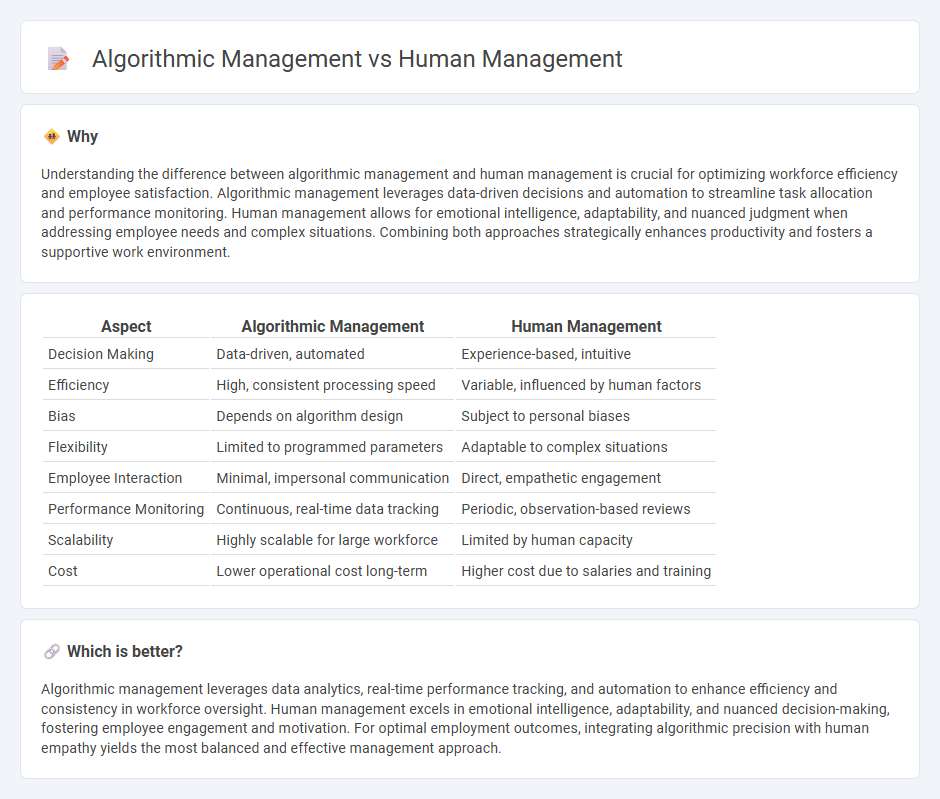
Algorithmic management uses data-driven algorithms and artificial intelligence to optimize workforce scheduling, productivity, and performance tracking, enhancing efficiency and consistency in decision-making. Human management relies on interpersonal skills, emotional intelligence, and contextual judgment to motivate employees, resolve conflicts, and foster workplace culture. Explore the key differences between algorithmic and human management approaches to understand their impact on employment dynamics.
Why it is important
Understanding the difference between algorithmic management and human management is crucial for optimizing workforce efficiency and employee satisfaction. Algorithmic management leverages data-driven decisions and automation to streamline task allocation and performance monitoring. Human management allows for emotional intelligence, adaptability, and nuanced judgment when addressing employee needs and complex situations. Combining both approaches strategically enhances productivity and fosters a supportive work environment.
Comparison Table
| Aspect | Algorithmic Management | Human Management |
|---|---|---|
| Decision Making | Data-driven, automated | Experience-based, intuitive |
| Efficiency | High, consistent processing speed | Variable, influenced by human factors |
| Bias | Depends on algorithm design | Subject to personal biases |
| Flexibility | Limited to programmed parameters | Adaptable to complex situations |
| Employee Interaction | Minimal, impersonal communication | Direct, empathetic engagement |
| Performance Monitoring | Continuous, real-time data tracking | Periodic, observation-based reviews |
| Scalability | Highly scalable for large workforce | Limited by human capacity |
| Cost | Lower operational cost long-term | Higher cost due to salaries and training |
Which is better?
Algorithmic management leverages data analytics, real-time performance tracking, and automation to enhance efficiency and consistency in workforce oversight. Human management excels in emotional intelligence, adaptability, and nuanced decision-making, fostering employee engagement and motivation. For optimal employment outcomes, integrating algorithmic precision with human empathy yields the most balanced and effective management approach.
Connection
Algorithmic management utilizes data-driven algorithms to monitor, assign, and evaluate employee tasks, enhancing efficiency and reducing human bias. Human management complements this by applying emotional intelligence and contextual judgment to interpret algorithm-generated insights and address individual employee needs. Together, they create a balanced employment environment that leverages technology for productivity while maintaining human-centered leadership.
Key Terms
**Human Management:**
Human management emphasizes emotional intelligence, personalized decision-making, and adaptability to complex social dynamics within the workplace. It fosters trust, motivation, and nuanced conflict resolution by leveraging human intuition and empathy, which algorithms often lack. Explore more to understand how human management impacts organizational culture and employee satisfaction.
Leadership
Human management leverages emotional intelligence, empathy, and nuanced decision-making to inspire and motivate teams, fostering a collaborative work environment. Algorithmic management employs data-driven insights and automation to optimize workflows, enhance efficiency, and reduce biases in leadership processes. Explore how integrating human intuition with algorithmic precision can transform leadership strategies and improve organizational outcomes.
Emotional Intelligence
Human management leverages emotional intelligence to build trust, motivate employees, and navigate complex interpersonal dynamics, enhancing team cohesion and productivity. Algorithmic management relies on data-driven insights and automation but often lacks the nuanced understanding of human emotions necessary for effective leadership. Explore how combining emotional intelligence with advanced algorithms can transform organizational performance and employee satisfaction.
Source and External Links
Human resource management - Wikipedia - Human resource management (HRM) is a strategic approach to effectively managing people in organizations, including staffing, training, development, and employee retention to improve productivity and organizational success.
What Is Human Resource Management? Careers, Skills ... - Coursera - HRM focuses on managing employees as valuable assets, enhancing job satisfaction, motivation, training, legal compliance, and fostering a positive company culture to drive business goals.
What is Human Resource Management (HRM)? - TechTarget - HRM involves recruiting, hiring, and managing employees to align their skills and development with organizational objectives, emphasizing employees as human capital to maximize ROI and maintain competitiveness.
 dowidth.com
dowidth.com